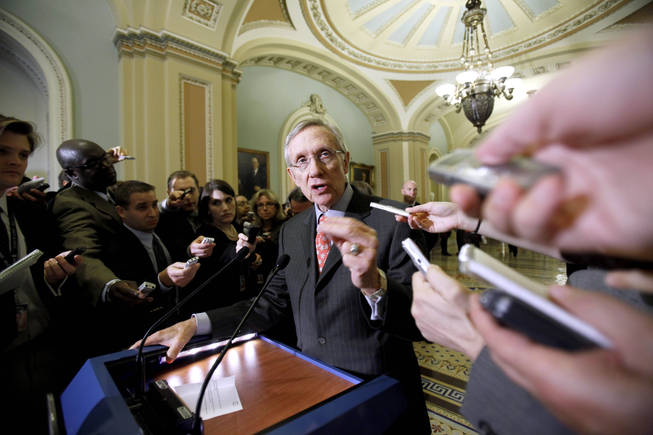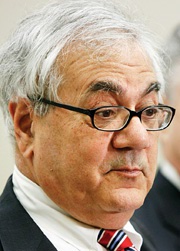
AP Photo/Harry Hamburg
Senate Majority Leader Harry Reid meets reporters on Capitol Hill in Washington, Thursday, Dec. 2, 2010.
Tuesday, Dec. 7, 2010 | 2 a.m.
Reader poll
Sun Archives
- Harry Reid pushes bill to allow for online gambling (12-3-2010)
- Nevada gaming companies see potential flush online (8-2-2010)
- Online gambling is illegal, but betting sites’ logos often in Nevada casinos (7-13-2010)
- Online poker law in effect, but players still manage to bet (7-11-2010)
- Question evolving from legalization debate: How to tax online casinos? (5-24-2010)
- Lawmakers push to regulate, tax online gaming (5-19-2010)
- With aggressive push, Internet gambling again in play (2-9-2010)
- Why casinos in Nevada won’t go online (for now) (8-20-2009)
- Will Web poker bust spark fight or flight? (6-15-2009)
- Poker players swarm site seeking input on big issues (5-19-2009)
- Web betting is wedge for Big Gaming (11-25-2008)
- Bush administration moves on Internet gaming band (11-12-2008)
- Gaming’s new frontier (11-23-2007)
- Online gaming in the shadows (7-17-2007)
With just days left before the 111th Congress calls it quits, Senate Majority Leader Harry Reid is taking what’s almost certain to be his last, best chance for a while to fast-track an effort to legalize Internet poker and deliver a prize to some of his biggest backers.
Reid has been circulating draft language for a bill that would create a licensing system for companies hoping to operate legal online poker forums in the U.S., establish federal regulations to police the new system and let both states and the federal government reap profits from this $25 billion industry.
But Internet gambling is as controversial in Washington as it has historically been in the gaming industry, meaning that while the lame-duck session is likely Reid’s best chance to push something through, it’s still going to be a hard road.
The bill is a work in progress, but opposition is in full swing on the Hill, where critics are lobbying against it on both moral and fiscal grounds.
Ranking Republicans of the House’s three committees with jurisdiction on Internet gambling — Spencer Bachus of Financial Services, Dave Camp of Ways and Means, and Lamar Smith of Judiciary — are lobbying the Senate against taking up any measure that “might be partially motivated by one of the gravest sins that afflicts this Congress: desperation for more tax dollars to pay for ever-increasing federal spending.”
“Creating a federal right to gamble that has never existed in our country’s history and imposing an unprecedented new tax regime on such activity require careful deliberation, not backroom deals or earmarks or special interests,” they wrote in a letter sent to Reid and Senate Minority Leader Mitch McConnell — who has historically opposed Internet gambling.
The letter amounts to little more than emphatic opposition from the minority. But in a few weeks, those same Republicans enter the majority in the House, from where they could easily stop similar legislation, adding to the urgency for Reid to work fast.
Lobbyists guess that the bill could hit the Senate floor as early as next week.
Reid won re-election with the backing of Nevada’s biggest gaming operators. For example, Caesars Entertainment facilitated union efforts to drive up voter turnout among members. And MGM Resorts CEO Jim Murren endorsed Reid in campaign ads.
Mainstream Republican opposition to legalization of online gambling has always been fierce. In 2006, one of the last acts of the Republican Congress was passing the Unlawful Internet Gambling Enforcement Act, which outlawed all forms of gambling online — and, advocates say, helped to drive this offshore business further underground.
Reid’s bill is still in flux, but at the end of the day would legalize only poker. That is as far as Reid, who opposed all forms of Internet gambling until just a few months ago, is himself willing to go.
Still, if it passes, it’s likely to bring about a sea-change in the gambling industry.
Poker’s popularity has boomed in recent years, and the online share is a $25 billion global industry with 15 million paying American customers.
Although the American Gaming Association is staying mum on the proposed legislation, it supports Internet gambling legalization as a way to boost business.
States will ultimately oversee the licensing and see the bulk of the revenue generated. But they would have to give the federal government a 20 percent cut as an annual fee to sponsor the licensing.
Internet gambling observers call Reid’s proposed bill the most nuanced and realistic effort to legalize Internet gambling by seeking a compromise among a complex web of business and government constituents.
By focusing on online poker, the bill is more politically palatable to industry opponents who view online poker — with an established base of customers who gamble from home computers — as little threat to their bricks-and-mortar operations.
The bill also considers the role of various regulatory schemes, including tribal regulators of casinos, and the rights of individual states to govern gambling within their borders.
Reid’s bill would outsource federal regulation to states or tribal governments with “extensive experience and a proven track record” of regulating gambling and allow states to opt in or out of a federal regulatory system.
Further, the bill tackles the touchy problem of how to handle the foreign companies that have long accepted bets from Americans, in violation of the Justice Department’s ban on Internet gambling.
Proposed language wouldn’t exclude these offshore companies upfront, as Massachusetts Rep. Barney Frank’s previous attempt at Internet gambling legalization would have done. Instead, any gambling operator can apply for a license in the Reid bill. And yet, proposed language would allow only operators of existing casinos or racetracks to obtain licenses in the two years after regulators issue the first Internet poker license.
This provision, one of the most controversial in the Reid bill, is a reasonable compromise, although it has upset poker players who view it as unfairly benefiting Nevada casino giants over their favored gambling websites, said Dan Michalski, founder and editor of Pokerati.com, a Las Vegas-based poker blog.
Some lawmakers and their constituents view these foreign companies as lawbreakers. And U.S. casino companies probably wouldn’t support an equal playing field for Web casino operators, given that the U.S. companies have waited on the sidelines for more than a decade for the chance to make money online, Michalski said.
“This kind of puts (the online operators) in the penalty box for a while and says, ‘We might let you in but you’re certainly not going to be the first in line.’ I think that was to be expected.”
Other key language leaves open the possibility that American casino companies could partner with Internet companies to license software, brand names or Web portals where potential customers gather and obtain coupons and other enticements.
Although Nevada’s casino giants no doubt want the first crack at the Internet gambling market, they and others need the specialized expertise of Internet operators that have been cultivating this business for years, according to a source who requested anonymity.
“This is going to be a horse race to see how fast people can partner with the Internet gambling operators, because no one is really ready for this in the U.S.,” the source said. “These are sophisticated systems. You have to build them, and then it takes time for it to ramp up before you can implement it.”
U.S. companies will need to tap player databases and technology owned by foreign operators to succeed, although they are estimated to generate less in earnings than investors have expected, in part because smaller operators have more limited opportunity to capture players, according to a report by gaming industry analysts at Morgan Stanley. Analysts concluded Monday it was “too difficult” to handicap the bill’s passage.
While addressing the business concerns of sometime opponents of Internet gambling, the bill probably won’t survive attacks from Republicans who have pledged to block bills backed by Reid and the Democrats, said I. Nelson Rose, an attorney and Internet gambling expert in California.
“Even though Democrats still have the majority, the perception is that Republicans are in charge,” Rose said. “And being the party of ‘no’ has worked in Republicans’ favor.”


Join the Discussion:
Check this out for a full explanation of our conversion to the LiveFyre commenting system and instructions on how to sign up for an account.
Full comments policy